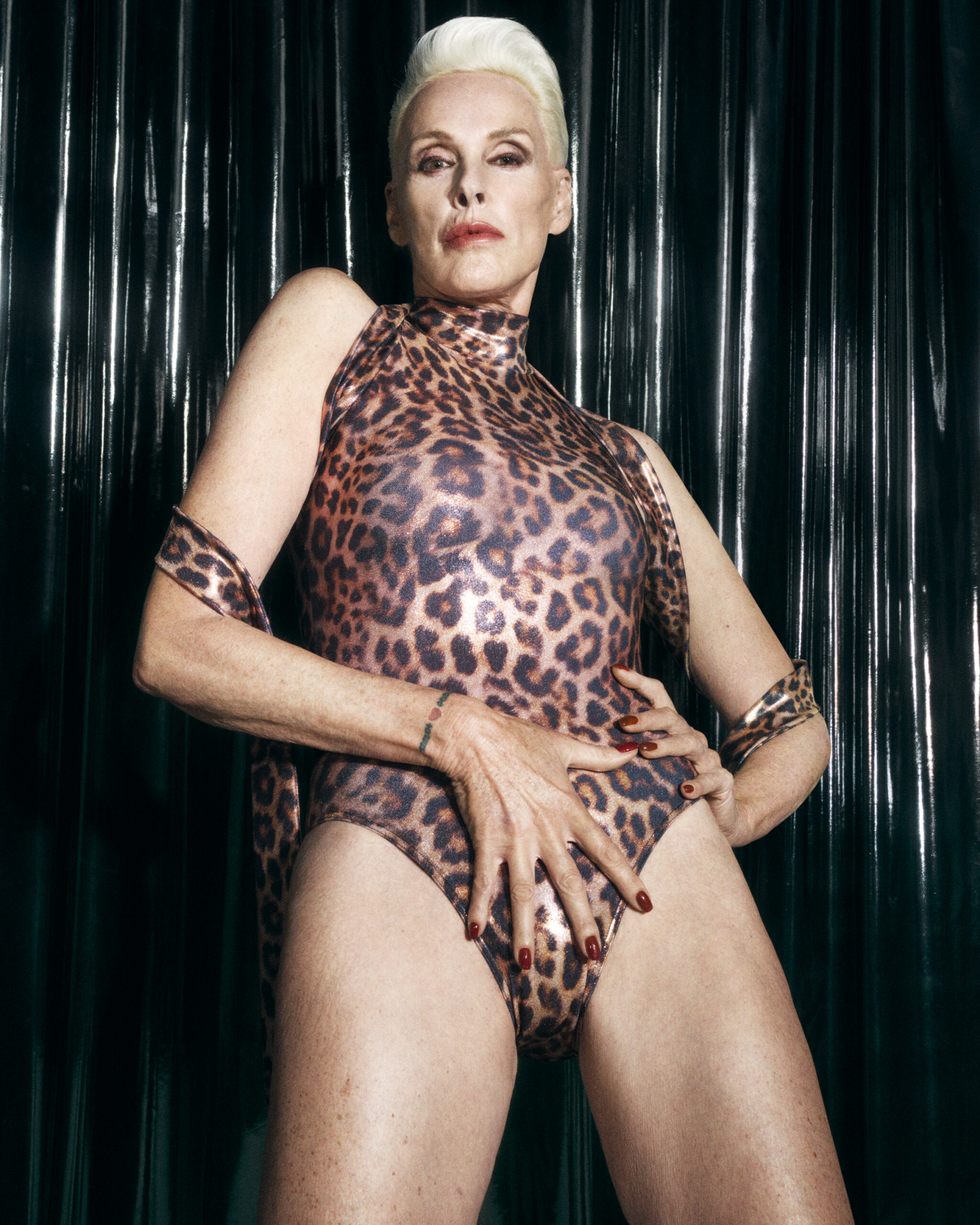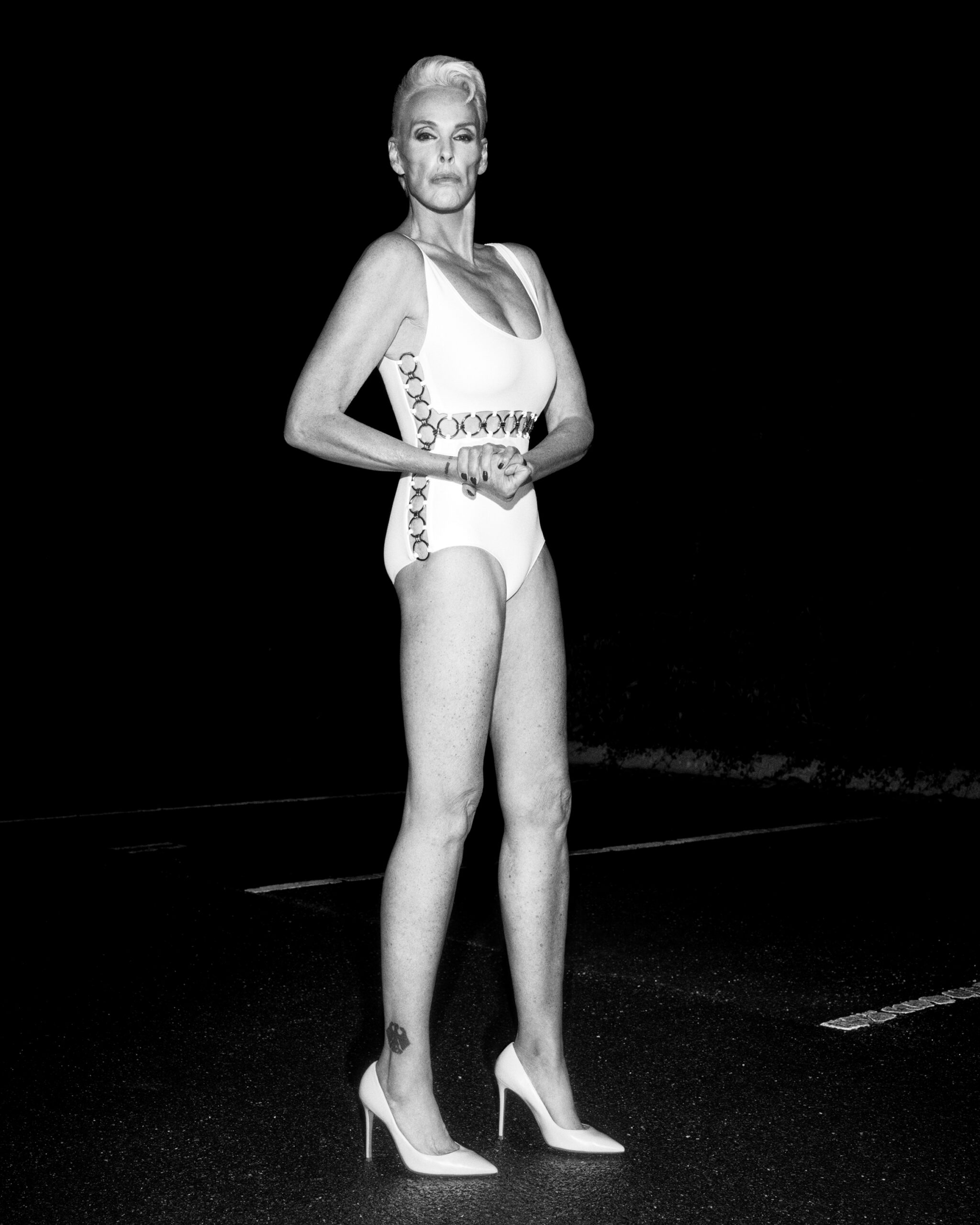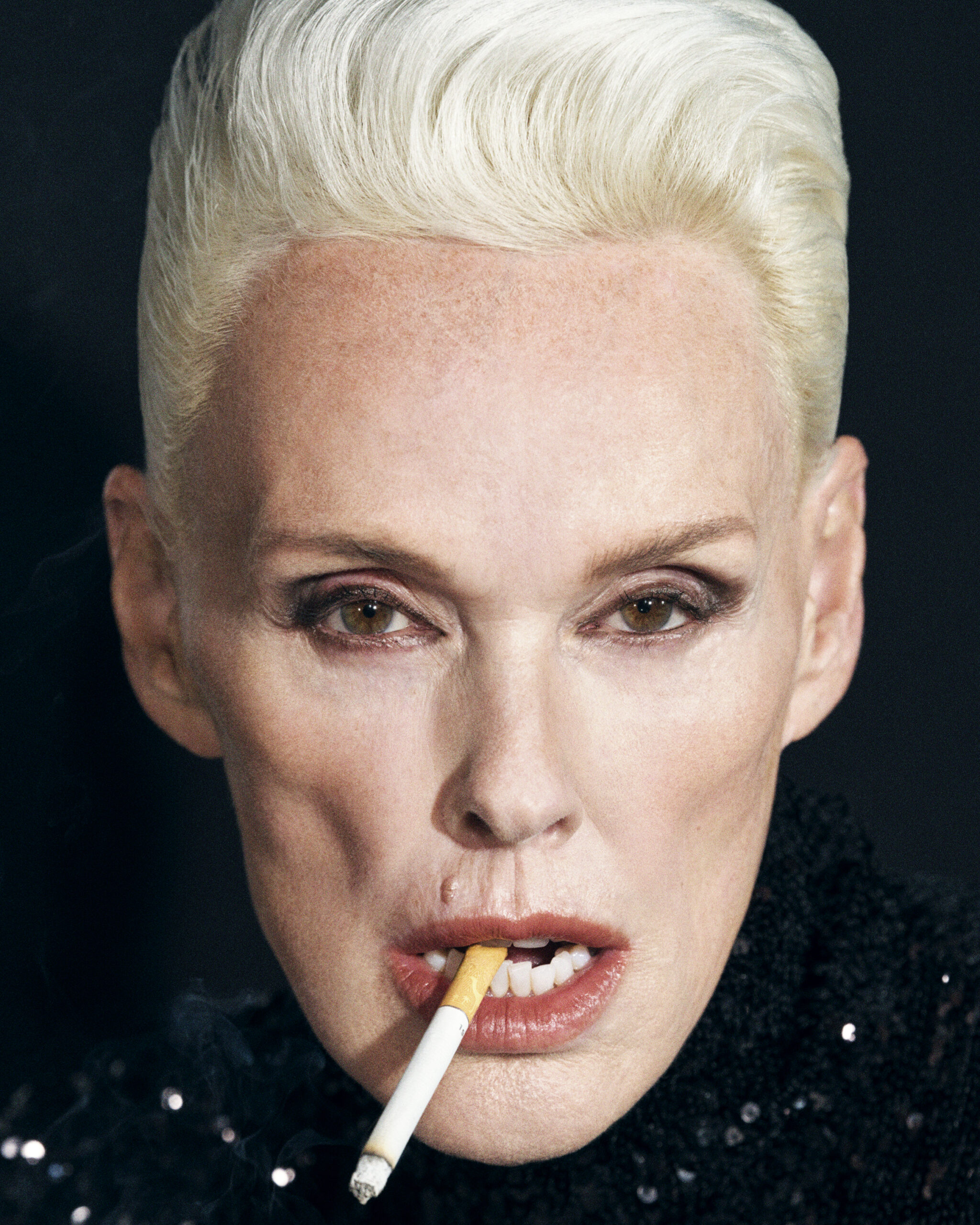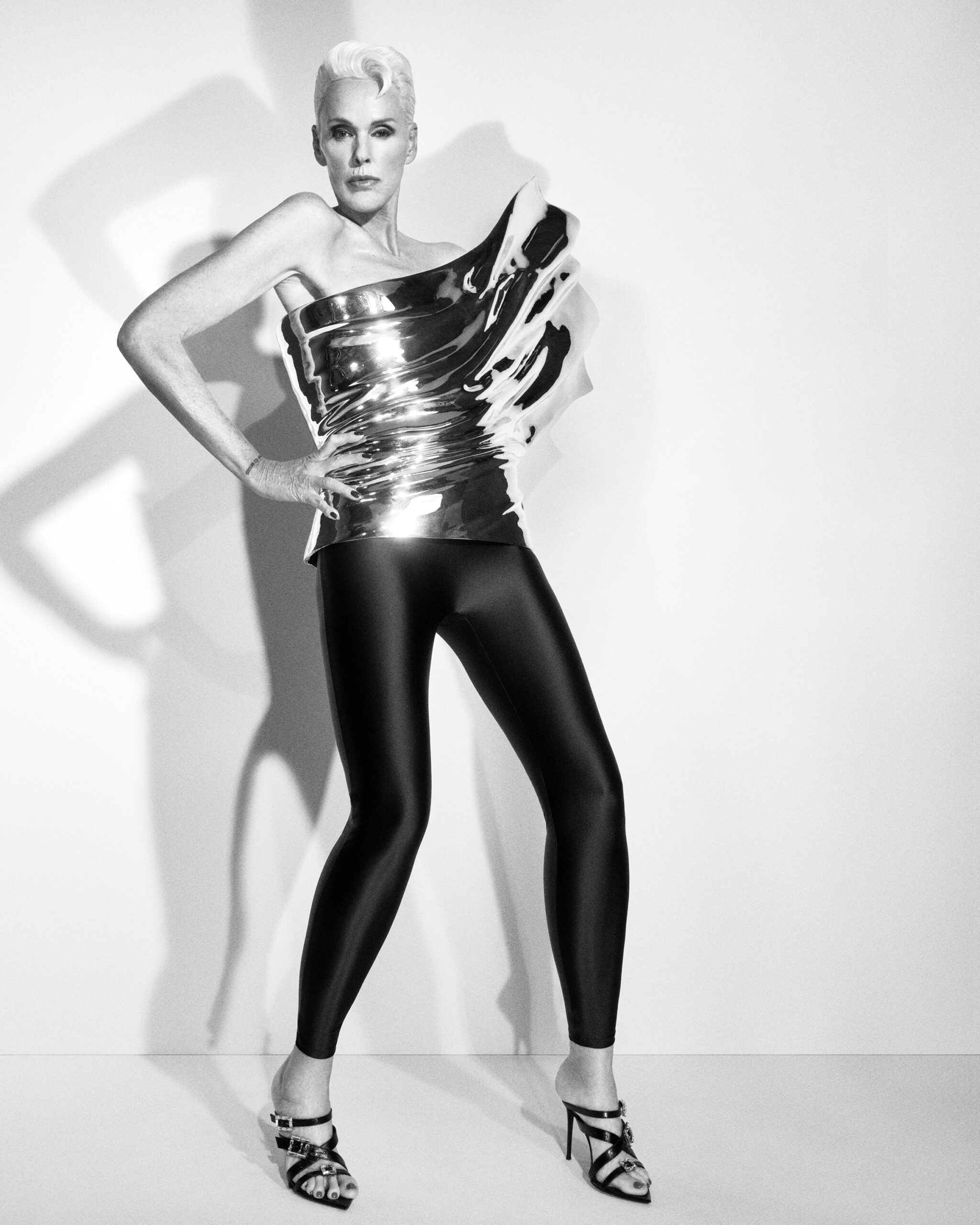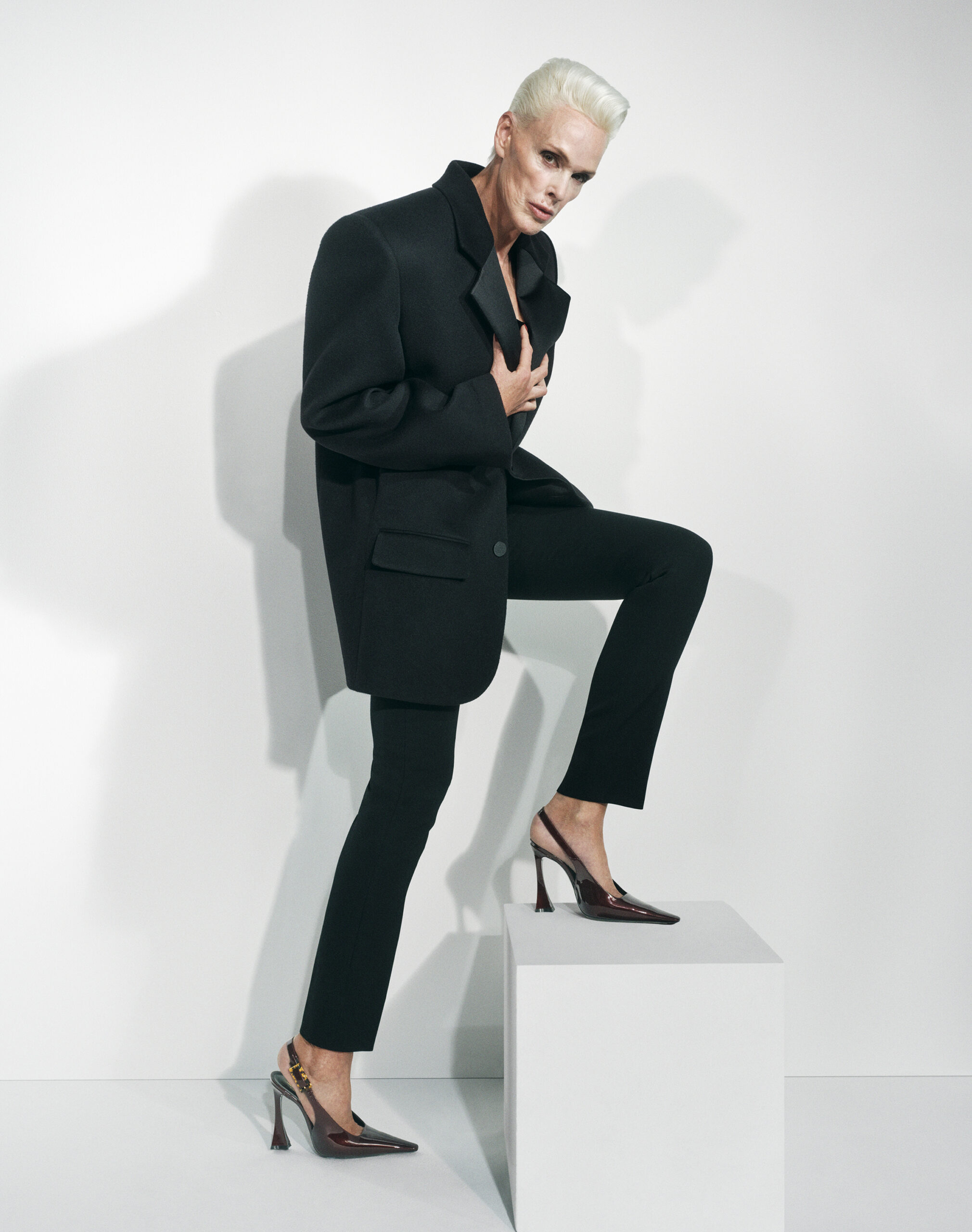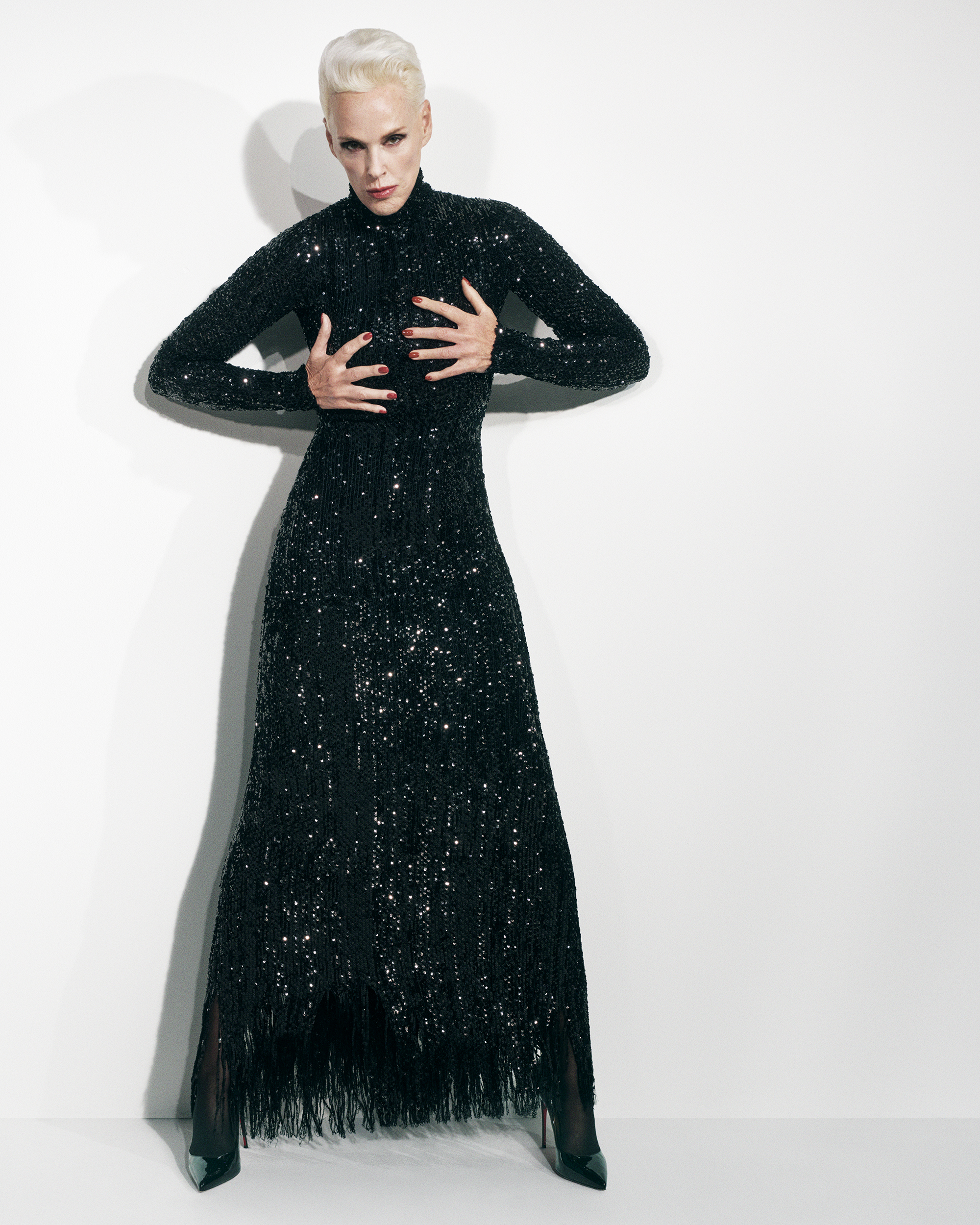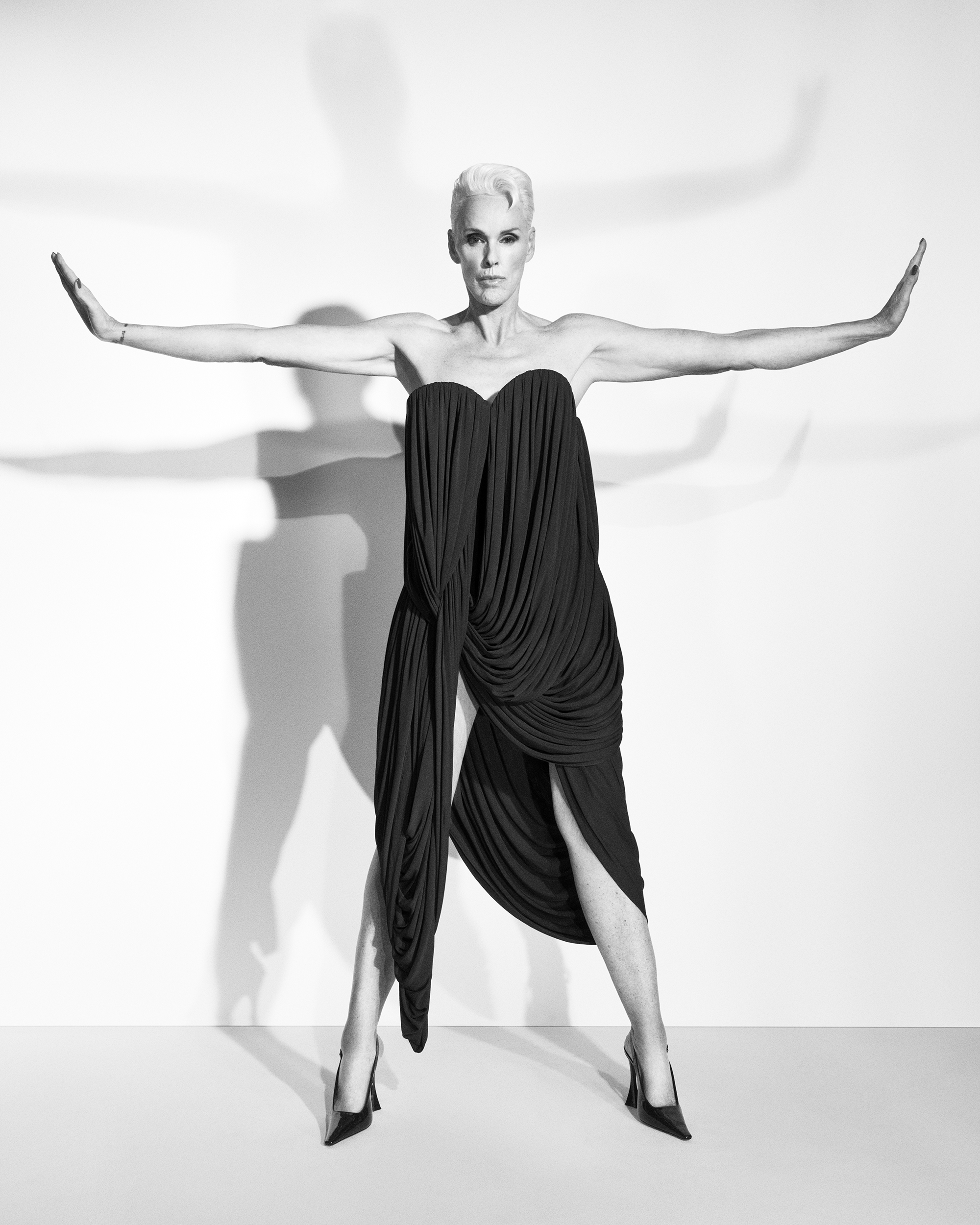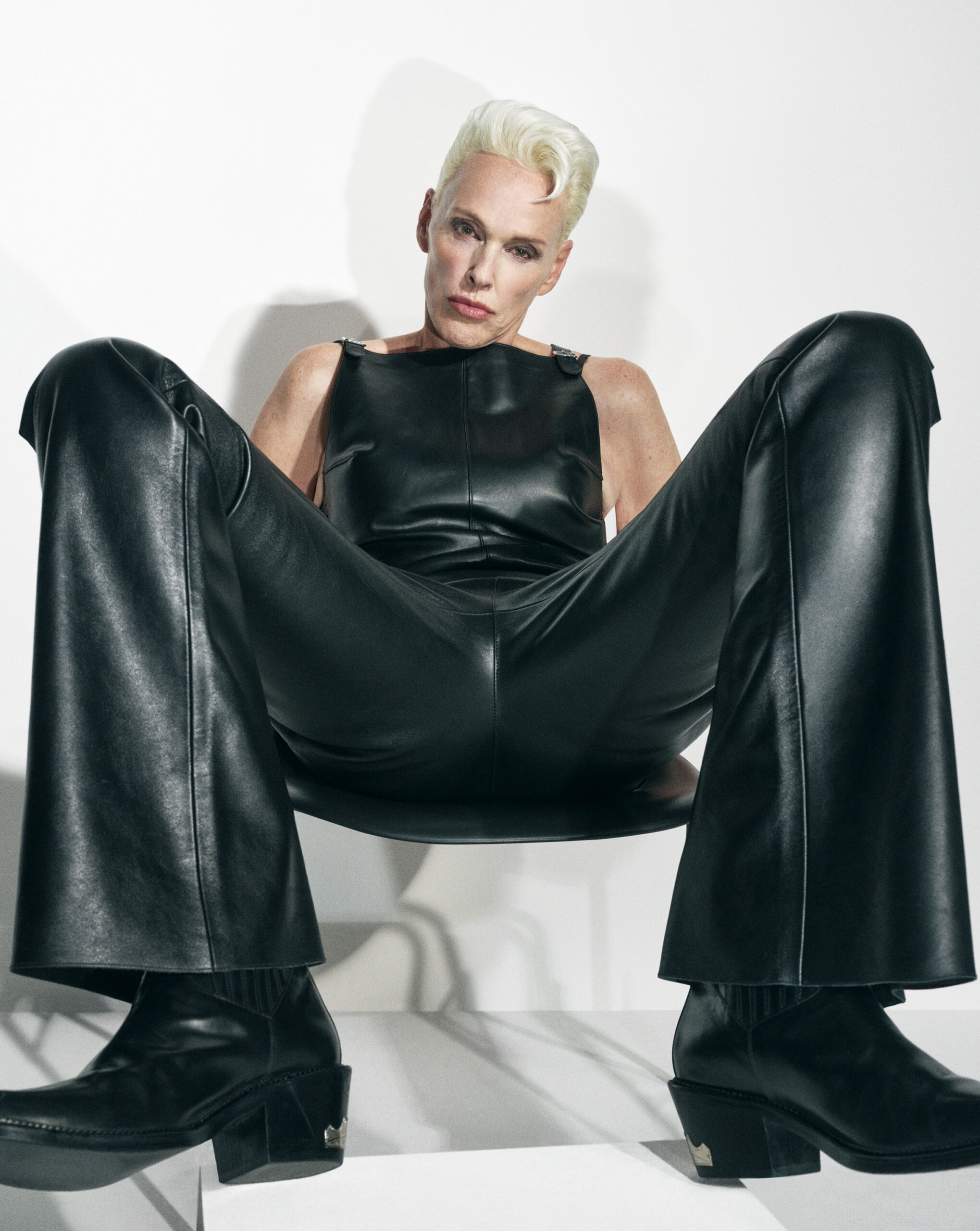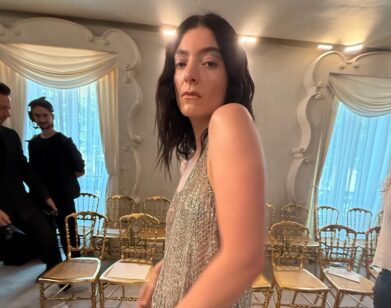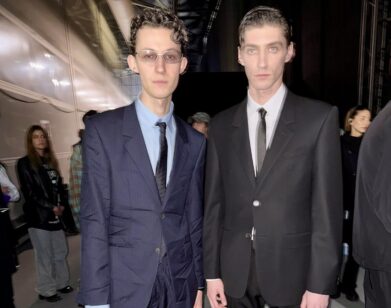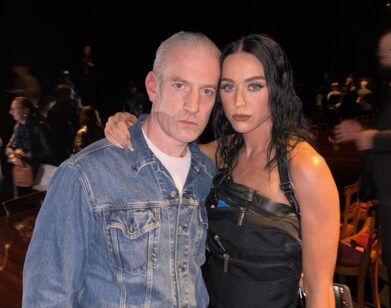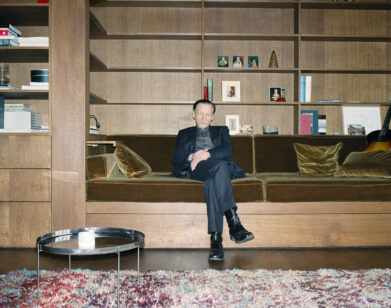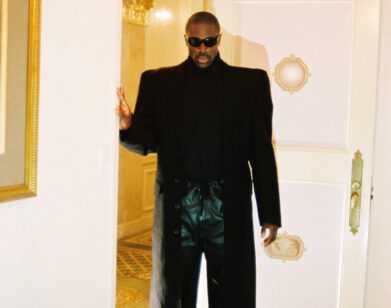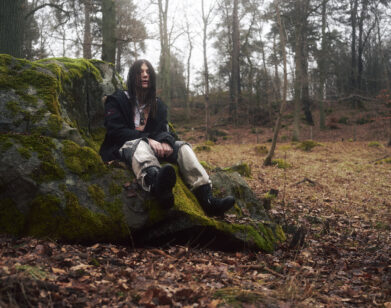ICON
Brigitte Nielsen and Sharon Osbourne are Sexy and Satisfied
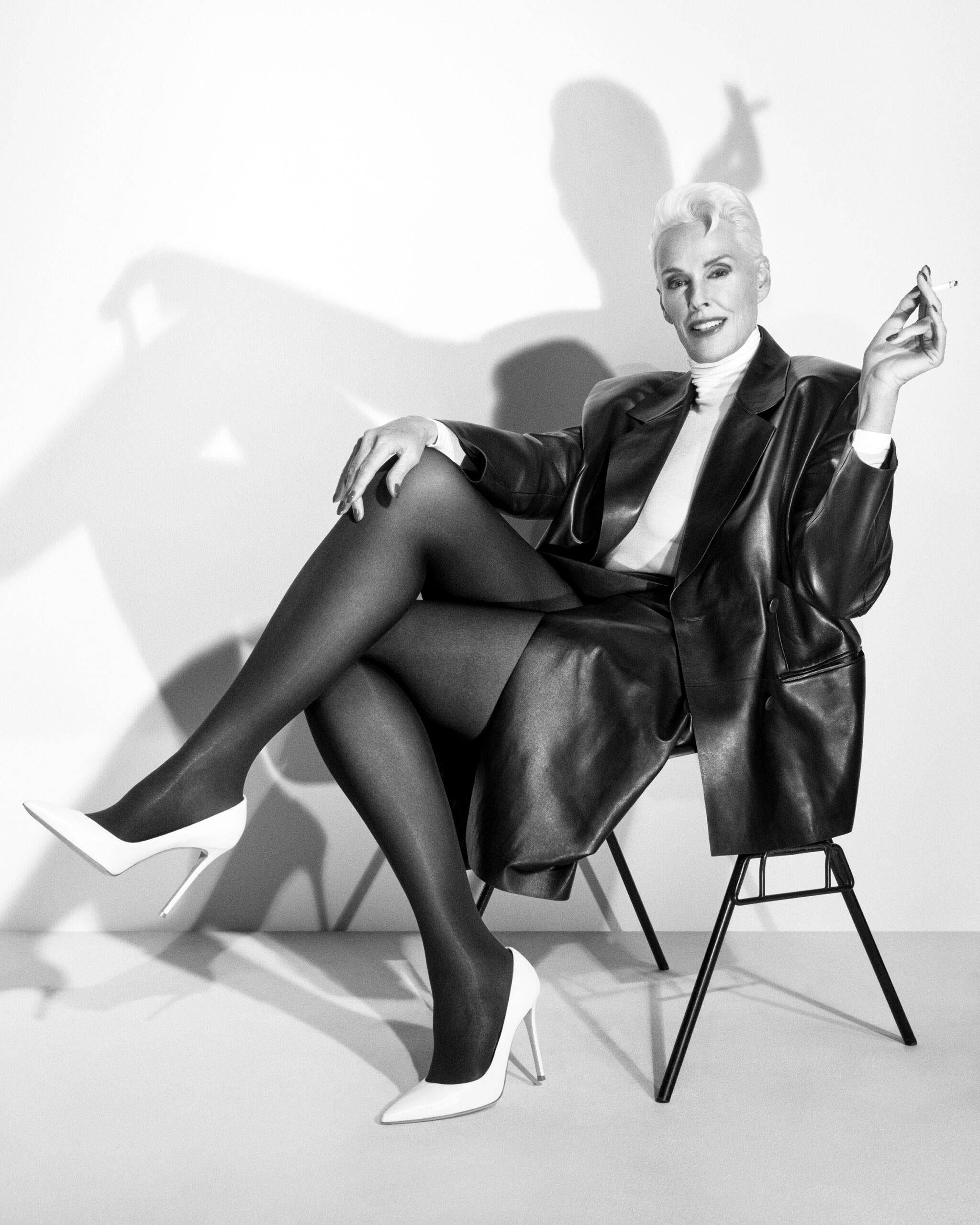
Brigitte Nielsen wears Jacket and Shirt Givenchy. Bodysuit and Tights Wolford. Shoes Gianvito Rossi.
“I’ve been down and out, but I never give up,” Brigitte Nielsen tells Sharon Osbourne over Zoom, from her new home in Spain. At 60 years old, the six-foot-one superstar is ready to own it all: her modeling career, punctuated by iconic Helmut Newton–lensed editorials; her dip into music with Falco and Giorgio Moroder; and her epic Hollywood run alongside her ex Sylvester Stallone, in films like Rocky IV and Cobra. And that was just the ’80s. Since then, Nielsen has brought her larger-than-life persona to endless flicks, reality shows, and highly publicized relationships, raising four boys and now, a 5-year-old daughter, while conquering a new generation of fans—including Balenciaga creative director Demna, who cast her in his Pre-Fall 2024 runway show. “I’m 60, I feel sexy, and I’m satisfied,” Nielsen tells Osbourne. “Screw everything else.”
———
TUESDAY 8PM FEB. 20 2024 MARBELLA, SPAIN
SHARON OSBOURNE : Brigitte?
BRIGITTE NIELSEN: Sharon! I can tell you’ve lost weight.
OSBOURNE: I have, my darling.
NIELSEN: It looks beautiful.
OSBOURNE: [Laughs] Thank you so much.
NIELSEN: When we were doing [Osbourne’s former show] The Talk together, I was like 178 pounds and I wanted to lose weight too, do you remember that?
OSBOURNE: Of course I do.
NIELSEN: I lost 37 pounds!
OSBOURNE: Amazing, doesn’t it feel good?
NIELSEN: I’m so happy because with my hip replacement and everything, I was just too heavy and I finally got it done. We are both slim, my darling.
OSBOURNE: It feels great.
NIELSEN: Doesn’t it? I mean, you look like you’re a teenager again, Sharon. I don’t know what I’m going to do with you.
OSBOURNE: Get out of here, missy.
NIELSEN: It suits you, it really does.
OSBOURNE: Thank you. Tell me, how is everything?
NIELSEN: Everything is amazing. We’re in Marbella now. Are you in Los Angeles or London?
OSBOURNE: I’m in Los Angeles this week, but I go back to London next week. Marbella is beautiful.
NIELSEN: We love it. We went on vacation two years ago and fell in love with the place. For me, it’s international enough and it doesn’t close down in winter. I have been really concerned about Frida, my daughter, having to go to school in L.A. It’s so infected with a lot of things that I don’t like for a little girl. So we got a place here and we are trying it out for a year. We are back and forth, busy renovating the house. Look, say hi Frida. She’s sitting here.
FRIDA: Hi.
OSBOURNE: Hi, Frida. How are you?
FRIDA: Good.
NIELSEN: She’s good. She has joined a school here in Marbella.
OSBOURNE: And she’s happy there?
NIELSEN: Yes.
OSBOURNE: Do you know what, Brigitte? I totally agree with you for not sending Frida to school here. It’s crazy.
NIELSEN: It’s been so disappointing. The last seven, eight years, it’s steadily gone downhill. If you’re selfish enough to have a child as late as I have, you have to make the best of it, and L.A. is just not for her. The crime, the misery, people are stressed out, depressed, things are not working. Anyway, we’re here in Marbella and I’m seeing my 80-year old mom all the time. I’m very close with her, and my four adult sons. Everything is around the corner once you’re back in Europe. Are you moving back to London?
OSBOURNE: Yeah, we have a house just outside of London in Buckingham. It’s the best of both worlds.
NIELSEN: That’s lovely. I must admit, I thought I’d miss L.A. The truth is I don’t miss it that much. It was nice to be back there in October for a while, but I’m very, very satisfied. I feel blessed, Sharon. In April I’m celebrating 20 years with Mattia [Dessì, her husband].
OSBOURNE: Time has flown by.
NIELSEN: I know, can you believe it? How many years have you been married?
OSBOURNE: 42 years.
NIELSEN: Oh my god. Sharon, only you can do that. Congratulations.
OSBOURNE: Congratulations to you.
NIELSEN: Thank you. I struggled to find the right guy, but you never give up on love. I finally found him and I remember everybody saying he’s too young, because he’s 15 years younger than me. All the people that were laughing, they’re all divorced now and we are still together, so there you go.
OSBOURNE: Exactly. Tell me this, how old were you when you first got discovered and became a model?
NIELSEN: I was 16. I come from a very little suburb outside of Copenhagen. Me and my girlfriend took the train into the city and put five crowns together to share one beer in a square in Copenhagen. We had this little beer, and felt like big girls in a new world. This woman kept looking at us and she said, “Hey, you should be a model.” It was actually a modeling scout from Elite out of New York. They said, “We’ll do some test pictures and see, because you’re pretty in person but you might not photograph well.” That’s how I started. I was supposed to go to university because I was very good in school even though I was bullied for it.
OSBOURNE: Why were you bullied?
NIELSEN: When I was 10, I was taller than my teacher and I was very, very skinny. I had braces for years, they pulled out six of my teeth. It was a nightmare. I changed schools three times. Kids can be really cruel. So when Mayana Diaz, I still remember her name, said I could model, I couldn’t believe it. I was hunched over and very insecure. Modeling literally made me stand up straight. I think that insecurity never really leaves you. You get to appreciate fame and fortune or whatever else, but the essence of you is always left. Unless you are in front of Helmut Newton saying, “You can never be tall enough and you look fabulous.” [Laughs] Modeling did a lot of good for me, but I hated to feel like a hanger. I got kind of, I don’t want to say bored, but a little bit. When I was 20, I was done. I wanted to go back to Denmark and open a bakery or become a librarian because that’s what my mother was. I came from a normal family.
OSBOURNE: Your career has been so varied with everything that you’ve done. I mean, you’ve been a model, an actress, you’ve done reality TV, you’ve done music.
NIELSEN: I’ve always given everything I’ve been passionate about a chance. I never thought about becoming a model. I never thought about being an actress. It just happened. What I really loved was music. I started out when I was 7 in the church choir and then we formed a band when we were 12. It was so much fun. Then, in ’87 I made my first record, but I never had enough success with it. In the ’80s, it was very much, like, if you do reality TV, you can’t be an actress. If you are an actress, you can’t be a singer. You were not allowed to mix and match. They didn’t understand, we are born artists and artists have many talents.
OSBOURNE: People always want to put you in a box.
NIELSEN: It was very frustrating, but I had wonderful times and decent success in Europe with my music. That led to a wonderful experience with good old Falco. Do you remember Falco?
OSBOURNE: Of course.
NIELSEN: Our song [“Body Next to Body”] was produced and written by Giorgio Moroder, who was at the time—
OSBOURNE: Huge.
NIELSEN: And Donna Summer and all of us used to hang out. For some strange reason in Europe it was very much appreciated, a little bit in the U.K., definitely not in America. I remember I was never tired in the studio. They would say, “How can you be in there 24 hours for days and days and days?” I would smoke my cigarettes and—
OSBOURNE: You loved it.
NIELSEN: It was a really, really great experience.
OSBOURNE: Now, if you could have your perfect gig, what would it be?
NIELSEN: Well, someone that I really got to know and used to shoot pool with in Los Angeles was David Bowie. I looked up to him in every sense, as a musician, as an incredible human being. I would like to redo “China Girl,” even though he was not too fond of that, and play the Hollywood Bowl with David Bowie. Can you imagine?
OSBOURNE: That would be amazing.
NIELSEN: Another one of course, and we often speak, is Grace Jones. Everybody thinks we are so similar. Even though she’s petite, we both have that look. She’s so much fun and I love her vibe and her voice and everything.
OSBOURNE: Because she’s so upfront and says what she thinks. People go, “She’s crazy. She’s a bitch.” She doesn’t bullshit and people are wary of that.
NIELSEN: That’s what happens when you’re outspoken, especially females. We’ve made some progress, but we need gender equality.
OSBOURNE: It’s amazing how in this business if you’re a woman who stands up for herself, you’re perceived as trouble.
NIELSEN: Yes, also when you look like I look. I’m six feet tall, and I’m always the villain in movies. People go, “Uh-oh, stay away from her. Be careful.” [Laughs]
OSBOURNE: Yeah, but that’s perception and not reality. It’s a part that you play. You’re an actress.
NIELSEN: Yeah but they love to be afraid of you. If you don’t have that intimidation effect on them, they would be disappointed. I remember, for example, Fantaghirò. It was a children’s series and I was the Black Witch. The kids would be so scared of me, but the more I scared them, the more they loved me.
OSBOURNE: Exactly.
NIELSEN: Also, a lot of people have a tendency to think they really know you and they say all these things about you, and they have often never even met you.
OSBOURNE: Well, different people bring out different sides in you, but what one person experiences, another experiences something totally different. Especially when you’re doing a lot of TV. People think that’s how you are all the time.
NIELSEN: It’s very true. There’s always a bit of you in the characters you play, but I’m not the person you see on TV. I had to do reality shows. There were actually some that I really liked, but I remember people saying, “Have you seen her? She’s gone from movies to reality shows.” What people did not know was that I had four children to take care of. The men I had children with never paid child support, marital support, nothing. I took four boys through school, through university, on my own. The things I achieved, I got because I worked hard. No one gave me a penny to create what we have today and that’s a really, really nice feeling.
OSBOURNE: It’s a great feeling. You don’t owe anyone anything. I know plenty of women—and I would never put them down—but if only they knew how freeing it is to do it on your own.
NIELSEN: It really is. I’ve reached a point in my life where I’m so comfortable and happy. I said the other day, “I’m 60, I feel sexy, and I’m satisfied. Screw everything else.” My daughter is amazing. My husband is great. We are having a wonderful life. I love that I went back to L.A. to do the Balenciaga show.
OSBOURNE: I wanted to ask you because the pictures were sensational.
NIELSEN: I said to Mattia, “This is where Sharon is at, this gorgeous presidential area.”
OSBOURNE: It was literally two streets away from me.
NIELSEN: First of all, Balenciaga is great. When I was young, when you were in your mid-twenties, your modeling days were over. Today we have different chapters and we’re appreciated for that.
OSBOURNE: There’s no sell-by date for women anymore. When I was a kid, it was like, “Oh my god, if you reach 40, you’re over. You have to act like an old person.”
NIELSEN: It’s interesting, my mom lives on the little island between Copenhagen and the big island; there’s mainly cows there—cows and bicycles. The people that grow old there, they feel old. You can see it in how they’re dressed, how they walk. It’s very good that we now have more freedom to feel beautiful and secure and still be able to do things in our 60s.
OSBOURNE: Women at 60 in England used to have their purse in their hand and a shopping trolley, laced-up black shoes, flat. You had to have a certain hairstyle. It was that perception of, “I’m old, that’s it.”
NIELSEN: That’s exactly how it is on my mother’s island. They didn’t get with a program at all, except for my mom, of course.
OSBOURNE: [Laughs] Tell me, do you speak Spanish?
NIELSEN: No, I’m learning. I speak four languages. I speak Danish—
OSBOURNE: Italian?
NIELSEN: Fluently. And of course, German, and English. Everybody was telling me, it’s going to be so easy for you to learn how to speak Spanish because you speak Italian. But grammatically it’s very different. In four months I should be able to carry a nice conversation at dinner, that’s my goal.
OSBOURNE: Frida, she likes the language?
NIELSEN: She loves it. She’s bilingual. Everything she does, she does in Spanish and English both.
OSBOURNE: How do you deal with the internet with Frida as she gets older?
NIELSEN: I don’t know how I’m going to deal with it. I think as a parent, you have to be on top of your game and you have to have excellent communication with your kid. You have to demand respect and transparency with your child. There are rules and there are times when we have fun and we get applauded for the nice things we do. I’m allowed to be the kind of mother I want to be here, as long as I still feel young and eager, Sharon. You never know. [Laughs]
OSBOURNE: That will be forever, Brigitte, come on.
NIELSEN: I’m always thinking, “Oh my god, when Frida is 15, I’m going to be 70 and she’s going to go, “You are the most embarrassing thing.”
OSBOURNE: Listen, I’m 72 this year. I think it’s one’s spirit inside.
NIELSEN: It is.
OSBOURNE: And your active life.
NIELSEN: Then, knock on wood because you can’t buy health. I haven’t smoked or drank for years, but I also am now very on to what I eat. I exercise. I want to feel the way I feel now for a long time. I want to do that because of me and because of my family and my dogs. I love animals so much. Even when I have flies in my house in the summer, I run around with a little net and catch them and I put them outside. That is extreme, I realize that, but I feel bad for them.
OSBOURNE: On the topic of animals, how do you feel about this new fashion style of the mob wife? Everybody wants real fur coats again. I think it’s disgraceful.
NIELSEN: Who are they? Where? What is this? I haven’t even heard about that.
OSBOURNE: It’s called the mob wives look. It’s a trend.
NIELSEN: They can do it with fake furs, they look even better and they’re cheap. How dare they? It should be against the law.
OSBOURNE: Women are buying secondhand vintage furs and they think it’s okay because this happened years ago. But it’s still a dead animal.
NIELSEN: The problem with that is the indirect message you send to young children that haven’t a foundation here called One World that’s a fund for children like we do in Denmark. We clean up after ourselves and take care of the planet, it’s the same thing. It’s a respect and understanding of wildlife and animals and how they’re supposed to be treated. These people that go and get an old fur and send the wrong message, they should be ticketed. We should have a little animal police running around and giving them a thousand-dollar ticket. It’s very, very unfair.
OSBOURNE: It’s disgraceful. It makes me physically feel sick.
NIELSEN: Me too. I get so angry sometimes. The truth is that so many people on this planet don’t care. They’re not interested in changing. You have to allow people to feel different, politically different, sexually different. We all have to live here. We cannot go out shooting people or killing animals because we are different.
OSBOURNE: Don’t you find now that there’s no middle ground? There’s no debate. All there is is hate speech. You can’t discuss anything.
NIELSEN: Yes, and especially in the United States. I remember in the ’80s—I can even smell the ’80s—people were happy, people were positive. Everybody was working and less depressed than they are today. It was so much fun. I thought, “Wow, this country, this is amazing.” Now in L.A., if you say the wrong thing, “Oh you’re racist or a body-shamer or this or that.” It’s devastating what’s going on, I can’t handle it.
OSBOURNE: People’s behavior and views are very extreme. I don’t think it’s just in America. It’s everywhere.
NIELSEN: There’s a lot of frustration and anger. The problem is that the planet is a very dangerous place. Ninety percent of people don’t have food or they’re in war or they’re miserable or they have no future. There’s no space to dream. There is no space to develop decency. I always think, “I’m so lucky, I was born in Denmark. I could have been born in Gaza. I could have been born somewhere in Africa where there’s no food or water.” We are still so privileged, but you’re right, Europe is becoming an angry place, too.
OSBOURNE: It is.
NIELSEN: Everybody wants to make a statement through crime and violence. They think that’s the only way to be seen or heard, which is so sad. No one wins.
OSBOURNE: And they talk about war crimes on TV, but war is a crime.
NIELSEN: It is, and it’s mainly women and children and the elderly that are being shredded. It’s so devastating. Sharon, you know what you and I need to do? We need to set up a show with a panel of women that think the way we do and teach people a lesson. No one has the balls to do it.
OSBOURNE: The thing is, we have life experience.
NIELSEN: Exactly. I’ve been down and out, but I never give up. We both have that energy.
OSBOURNE: Because we have that life experience and we are survivors and strong women. It’s a great combination.
NIELSEN: It is. And we’re both slim now.
OSBOURNE: So don’t fuck with us.
NIELSEN: How many pounds did you lose?
OSBOURNE: About 45 now.
NIELSEN: Really? I lost 37. It took me two years. My hips are loving it. My double hip replacements. They’re like, “Yay!”
OSBOURNE: Did you have them done together?
NIELSEN: My left hip was so bad I was in a wheelchair for six months, so I got it done. Then I got pregnant with Frida and I said, “The minute she’s out of me, I’m having the right hip done so I can run after her.” It was the best decision I ever made. At the Balenciaga show, they got me in 18-centimeter stiletto boots. There were potholes on the street. I was praying, “Hips better hang in there!”
OSBOURNE: I know, when I saw the photos, I was like, “Wow, unbelievable.” What a brilliant idea to do a fashion show like that.
NIELSEN: It was so iconic. I loved the diversity of the people. People criticize it and say, “Some of them don’t look like models.” And I’m like, “What are you seeing wrong? Everybody had their uniqueness.” I really loved it. I want to do more of that. Give me 20 centimeters, no problem. I’m ready to go.
OSBOURNE: Oh my god, yes. You should walk every runway from now on.
NIELSEN: I feel like I’ve started a new chapter in my life. I have my modeling agency in Los Angeles, I have one in Europe. I’m 60 and I’ve started modeling again, who would’ve thought? There’s a place for us, Sharon.
OSBOURNE: Thank god.
NIELSEN: Sharon, I could talk with you forever. I adore you and you are so interesting.
OSBOURNE: It’s for me to say that to you.
NIELSEN: Thank you for your time and thank you for being my friend. The first time I came to The Talk, you were so sweet with open arms. I truly appreciate you, so much.
OSBOURNE: I appreciate you. I respect you.
NIELSEN: I love you. Kisses to all the dogs, to the whole family. Have a safe trip back to London. We’ll stay in contact over the summer, maybe we’ll get together, okay, my darling?
OSBOURNE: I would love it.
———
Hair: Joseph Pujalte at Bryant Artists.
Makeup: Christine Corbel using Sisley at MA+ Talent.
Nails: Sally Derbali.
Set Design: Giovanna Martial at Bryant Artists.
Movement Direction: Ryan Chappell.
Digital Technician: Halldora Magnusdottir.
Photography Assistants: Bradley Polkinghorne and Vassili Bolcé.
Fashion Assistant: Salomé Rouquet.
Tailor: Laura Giaferri.
Makeup Assistant: Emanuela Farano.
Set Design Assistants: Lukas Oheix and Paul Langsley.
On-site Production: Clément Hoffman.
Retouching: MCD Creative.
Location: Studio Rouchon.

